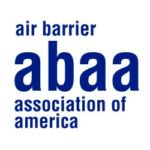ACCREDITED CONTRACTORS
The air barrier industry is no different than other construction related industries. We see the number of buildings failures across United States due to poor workmanship. Contractors now have increased liability and are responsible for the installation. You can no longer walk away when you are done. Unfortunately, many construction industries compete on an uneven playing field that makes it difficult for contractors interested in doing a professional job to compete. If you are an Air Barrier Contractor that is quality oriented and strives for perfection, it can be an uphill battle at times.
ABAA promotes our accredited contractors to design professionals across America. We encourage the professional community to adopt the ABAA Quality Assurance Program and specify ABAA Accredited Contractors in all air barrier projects.
What are the benefits of becoming a Licensed Air Barrier Contractor?
In today’s competitive environment, any advantage a Contractor has can make the difference between success and failure.
So why become an ABAA Accredited Contractor?
As an ABAA Accredited Contractor, you’ll receive:
- Company listing on ABAA’s nationally promoted website as an ABAA Accredited Contractor
- Education and outreach tools to educate General Contractors, Design Professionals and Building Officials
- Technical assistance on design, installation and quality control issues
- New technical information based on new research, publications, industry initiatives and other resources to keep you current
- Sponsorship and advertising opportunities at workshops, seminars and promotional functions.
What Do I Need to Do to Be An Accredited Contractor?
In order to be an Accredited Contractor, you need to employ a Level 3 Certified Installer and one individual trained in the Quality Assurance Program.
All of the following requirements must also be completed before you are granted ABAA Accredited Contractor status and before you can be awarded ABAA specified jobs.
- Completed Contractor Application Form (PDF)
- Completed Contractor Licensing Agreement (PDF)
- Payment of Contractor Membership (January 1st – December 31)
- Payment of Contractor Licensing Fee (January 1st – December 31)
- Submit a copy of an insurance certificate indicating $2 million in general liability
- Submit a letter indicating the company’s bonding ability (min. $300,000)
- Employ a minimum of one (1) ABAA Level 3 certified installer
- Employ a minimum of one (1) individual that has successfully passed the ABAA QAP Admin Exam
ADDITIONAL INFORMATION
What are the Costs For the ABAA QAP?
There are upfront one-time costs for a project that is specified with the ABAA QAP.
The ABAA has third-party licensed Field Auditors that audit every project, those costs must be added into the ABAA Accredited Contractor’s bid price. The cost of each audit is $2,000 and the number of audits is dependent on how many the design professional specifies. The number of audits that ABAA recommends can be found here. (PDF)
There is also an Industry Development Fee (IDF) charged at $0.085 per square foot of total air barrier materials applied on all ABAA specified projects; which assists in funding the association’s day-to-day management and marketing of its Quality Assurance Program and members to the design community.
Why Do I Need to Submit Job Bid Notifications and Awarded Job Notifications?
To ensure our and your continued success, we need your help.
First, all ABAA Accredited Contractors are required to submit a job bid notification when preparing to bid on an ABAA specified project. Second, all ABAA Accredited Contractors are required to notify the ABAA office about all awarded projects, even if not the successful Air Barrier Contractor.
This helps the Association track projects and provide direct assistance when a project is not awarded to a non-ABAA contractor.
What Happens When I Lose a Bid to a Non-ABAA Contractor?
Immediately notify the ABAA office and we will contact the Architect and General Contractor. Our QAP administration staff will follow up directly to ensure the job is awarded to an ABAA Accredited Contractor.
There are two options:
- The Architect insist the contract be awarded to an ABAA Accredited Contractor, as per the project specifications and fully complied with on the project.
- The Architect removes the requirement for the project to follow the ABAA QAP
ABAA will always work with the interested parties to ensure the ABAA Quality Assurance Program is not removed from the project master specifications.
